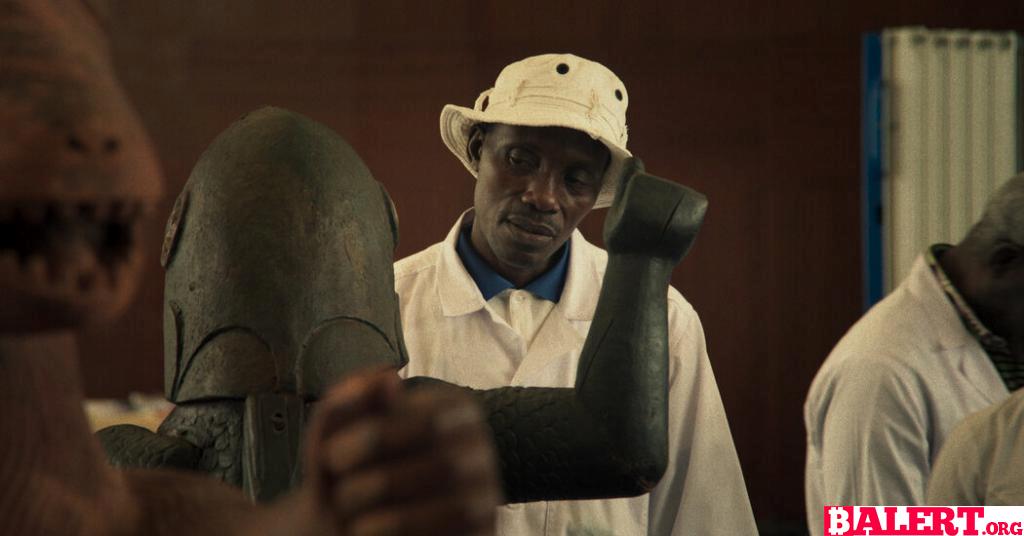World
Exploring Cultural Narratives at the Toronto International Film Festival
Dive into the rich tapestry of global storytelling at the Toronto International Film Festival. Discover how diverse cultural narratives shape cinema, provoke thought, and foster connection among audiences worldwide.

Exploring Global Cinema at the Toronto International Film Festival
Each year, the Toronto International Film Festival (TIFF) transports me around the globe, allowing me to explore diverse cultures through the lens of cinema, both in vibrant colors and stark black and white. On the very first day of this year’s festival, which concludes on Sunday, my cinematic journey whisked me away to Mexico, France, Benin, South Africa, the United States, England, and Japan. One of the greatest gifts of an expansive festival like Toronto is its ability to remind us that the world of film extends far beyond the confines of Hollywood, that small, insular town known for its blockbuster productions.
The past few years have presented significant challenges for the festival scene, grappling with the lingering effects of the pandemic, compounded by the consecutive actors’ and writers’ strikes in 2023. These strikes left festivals like Toronto with nearly vacant red carpets, affecting the glamour normally associated with such events. Additionally, TIFF faced another setback when it lost a long-time key sponsor, Bell Canada. However, in the wake of these challenges, the festival has successfully attracted a new array of sponsors and established a vibrant marketplace for buying and selling films, supported by substantial investment from the Canadian government. This revitalization is not only promising for TIFF but also vital for the overall health of the film industry, which thrives on the kind of innovative, independently driven projects showcased at Toronto and similar festivals.
Amidst the usual critiques regarding the program’s offerings—some festival programmers have mentioned that 2024 may be a rather lackluster year—there remains a palpable sense that TIFF continues to hold its ground, even if it feels less essential than in previous years. This year’s lineup has reaffirmed my belief that, despite the seemingly dire state of the film industry, there will always be visionary filmmakers crafting exceptional and even transformative documentaries and narrative fiction.
The outlook for cinema may often appear bleak, yet creative minds like Mati Diop, along with art-house legends such as Mike Leigh and Pedro Almodóvar, are ensuring that the clouds do not overshadow the brilliance of filmmaking.
One standout film at this year’s festival is Raoul Peck’s documentary about the photographer Ernest Cole. In 2019, Mati Diop, a Senegalese-French director, made history at the Cannes Film Festival with her debut feature, “Atlantics,” which marked her as the first Black woman to compete in the event’s main competition, ultimately winning the Grand Prix, the festival’s second-highest honor. “Atlantics” is a dreamlike exploration of love and loss, capturing the themes of departure and belonging as it follows a woman whose true love leaves Senegal for Europe—a narrative that Diop likened to “the Odyssey of Penelope” during our discussion at Cannes.
In her latest work, “Dahomey,” which garnered top accolades at the Berlin festival, Diop navigates another complex journey, probing the political and philosophical implications surrounding France’s return of 26 looted treasures to Benin in 2019. “Dahomey” is a breathtaking examination of cultural and artistic heritage in the aftermath of colonialism, standing out as one of the year’s most significant films. (It is set to screen at the New York Film Festival soon.) Spanning a beautifully intricate and concise 68 minutes, “Dahomey” begins in Paris, wittily introducing its themes with a visual of vibrantly colored Eiffel Tower souvenirs, reminiscent of those sold by African street vendors. From there, Diop shifts to the Quai Branly Museum, where the treasures—looted in 1892 by French troops during the colonial era when Benin was known as Dahomey—are being meticulously packed for their historic return. As one of the statues begins to narrate in a deep, mesmerizing voice-over, I found myself completely captivated.
World
Dominique Pelicot Testifies in Harrowing Rape Trial
Join us as Dominique Pelicot courageously testifies in a harrowing rape trial, shedding light on the complexities of trauma and justice. Her powerful story raises crucial questions about the legal system and the importance of support for survivors.

Dominique Pelicot Takes the Stand in Shocking Rape Trial
In a courtroom drama that has captivated France and garnered international attention, Dominique Pelicot, the man at the center of a harrowing rape trial, finally addressed the court. With tears streaming down his face, he recounted how his wife had been instrumental in helping him cope with a tumultuous past marked by trauma. He revealed that he had endured a sexual assault at the tender age of nine while hospitalized, and he also witnessed a gang rape during his teenage years while working as an apprentice electrician on a construction site.
“She didn’t deserve this, I acknowledge that,” Mr. Pelicot stated, his voice barely audible as he struggled to convey his emotions. The gravity of the situation weighed heavily on him, and the courtroom fell silent, straining to catch his every word.
Now 71 years old, Mr. Pelicot faces serious allegations of drugging his wife, Gisèle Pelicot, whom he has been married to for half a century, over a span of nearly ten years. Prosecutors contend that he used drugs to render her comatose, allowing him to rape her repeatedly. Furthermore, authorities allege that he went so far as to invite numerous men into their home, facilitating a nightmarish scenario where they, too, engaged in the assault of his wife.
Overall, 51 men, including Mr. Pelicot, are on trial concurrently, primarily facing charges related to the aggravated rape of Ms. Pelicot. Among them, one individual has already pleaded guilty to similar crimes, admitting to drugging his own wife to assault her and inviting Mr. Pelicot to partake in the horrific act while she was incapacitated.
Mr. Pelicot’s unexpected testimony came after a tumultuous start to the trial. Just a week in, he was stricken with severe health issues that forced him to miss four consecutive days in court. The head judge ultimately decided to postpone proceedings, as Mr. Pelicot was diagnosed with kidney stones, a kidney infection, and prostate complications, adding yet another layer of complexity to this already harrowing case.
World
Meta Bans Russian State Media Outlets from Social Media Platforms
Explore the implications of Meta’s decision to ban Russian state media outlets from its social media platforms. Understand the impact on information dissemination and the ongoing battle against misinformation in the digital landscape.

Meta Imposes Global Ban on Russian State Media Outlets
In a significant move, Meta Platforms, Inc., the parent company of Facebook, has announced the prohibition of Russian state media outlets, including RT (Russia Today) and Rossiya Segodnya, from all its social media platforms. The decision stems from the company’s concerns regarding the deceptive strategies employed by these media organizations to execute covert influence operations across the internet.
Meta made this announcement on Monday, emphasizing that the ban will be enforced worldwide across its various platforms, such as Instagram, WhatsApp, and Threads. The rollout of this ban is expected to take place over the coming days.
Statement from Meta
A spokesperson for Meta elaborated on the decision, stating, “After careful consideration, we have expanded our ongoing enforcement actions against Russian state media outlets. As a result, Rossiya Segodnya, RT, and other affiliated entities are now banned from our applications globally due to their involvement in foreign interference activities.”
For further insights into this development, watch the video in the player above.
World
Trump Recalls Alleged Assassination Attempt While Golfing
Explore Donald Trump’s chilling recollection of an alleged assassination attempt he experienced while enjoying a round of golf. Delve into the tense moments and his reflections on safety, fame, and the unpredictability of public life.

In a recent interview on the social media platform X, Republican presidential nominee Donald Trump recounted a harrowing incident he claims to have experienced while playing golf. Trump described how, during a peaceful Sunday morning round with friends, the tranquility of the day was abruptly shattered by the sound of gunfire in the air.
“It was a beautiful day, everything was just perfect,” Trump reflected. “Then all of a sudden, we heard shots being fired—probably around four or five in total.” He went on to explain that a Secret Service agent was the first to spot the suspect, who was allegedly armed with an AK-47, a powerful assault rifle.
“The agent saw the barrel of the weapon and immediately took action, returning fire at the barrel and aiming in the direction of the bushes,” Trump detailed. “I would have loved to have sunk that last putt, but we decided it was best to leave the scene promptly.”
Trump expressed his gratitude towards the agents and a vigilant civilian who aided in tracking down the suspect, who was eventually apprehended following a high-speed chase.
Suspect Faces Multiple Federal Gun Charges
The FBI has identified the suspect as Ryan Wesley Routh, accusing him of targeting Trump during his time at the golf club in West Palm Beach, Florida. According to an FBI report, Routh had allegedly hidden among the hedges of the golf course for an astonishing 12 hours. Authorities discovered an SKS-style assault rifle, a GoPro camera, and a bag of food at the scene.
The 58-year-old Routh is now facing two serious federal gun charges. If convicted on both counts, he could face a combined maximum sentence of 20 years in prison. Notably, neither of the charges is directly related to an assassination attempt. The first charge pertains to possessing a firearm despite a prior felony conviction, which carries a potential 15-year sentence, a fine of $250,000 (€225,000), and three years of supervised release.
The second charge involves possession of a firearm with an obliterated serial number, which could result in a five-year prison term, the same financial penalties, and also three years of supervised release. As the investigation continues, additional charges could be forthcoming.
While the motive behind Routh’s actions remains unclear, his digital footprint reveals strong political affiliations, particularly concerning issues surrounding Ukraine and China. Routh consistently expressed support for Ukraine across various social media platforms, even claiming to have orchestrated a recruitment scheme for international volunteers aiming to assist Ukraine in its fight against Russia’s invasion. This behavior has been denounced by Ukrainian soldiers and members of the International Legion, who disavowed Routh’s actions and motives.
-

 Business4 months ago
Business4 months agoObituary: Dan Collins
-

 Business3 months ago
Business3 months agoThe Significance of Jackson Hole: A Central Banking Tradition
-

 Gaming5 months ago
Gaming5 months agoMore than a thousand students vowed not to work for Amazon and Google due to the Nimbus Project.
-

 World5 months ago
World5 months agoRussia and North Korea Strengthen Defense Ties
-

 Business5 months ago
Business5 months agoJump Crypto Invests $10 Million in Pro-Crypto PAC
-

 Article5 months ago
Article5 months agoCreative Design Applications Developed with Artificial Intelligence
-

 Tech2 months ago
Tech2 months agoNew Leaks and Features About the Samsung Galaxy S25 Ultra
-

 Gaming5 months ago
Gaming5 months agoThe Inspirational Success Story of Avon’s Founder Who Sold Books Door to Door














